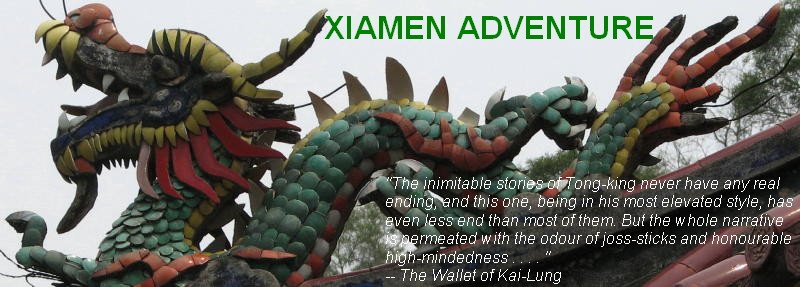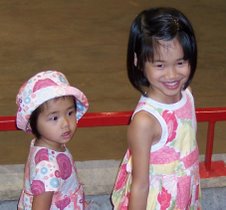Last month, I met a professor who teaches in the history department – his specialty is American history, and he’s written a book, in Chinese, about the American Revolution. He asked me to come speak to his class today – a class in American Intellectual History. The professor asked me simply to engage in a “free and open discussion” about all things American, so I didn’t have any prepared remarks. I just answered questions from the students for two hours!
I also had an interesting conversation with the professor as we walked to his class. He met me outside my apartment building to show me the way – he had said he would send someone to escort me, but I hadn’t expected it to be him! He was very interested in the girls, how they were reacting to China and kindergarten, and in the midst of the discussion he said he had two boys, aged 5 and 7. He admitted that people sometimes made very disparaging comments about the fact that he was adding to the overpopulation problem in China and violating the rules, etc. We also commiserated over being “older” parents – he shared that he had not married until he was 35 and that it was 8 years after the marriage before they had children.
Back to the students – most of them are writing papers for the class, and asked me questions relating to their topics. They were certainly interested in a variety of topics: gun control, race relations, AIDS, the religious right, and gay rights, to name a few. And the questions seemed very well thought out.
Some of the more interesting questions: Would the fact that the Virginia Tech shooter was Korean have an effect on race relations in America? Why didn’t the international community, including the United States, bring pressure on Japan to make apologies and reparations for World War II atrocities, like we brought pressure on Germany to do so? What role did Thomas Jefferson play in the drafting or ratification of the Bill of Rights? Would Hilary Clinton be the next U.S. president, and could Bill Clinton be vice-president (!)? Did Alexander Hamilton support a national bank because he really believed it would help commerce or because he was rich and desirous of helping his rich friends? Had I seen the movie “The Day After,” and did it awaken Americans to the potential for environmental disaster?
In the midst of all of this talking, I was explaining my last article to them – about the natural-born citizen clause of the U.S. Constitution – and the concept of “perpetual foreigner” in America (the fact that we tend to see people as belonging to their country of origin or perceived country of origin, rather than to America, even if they are American citizens). I used my mother as an example – the fact that she is perceived as French, rather than American, because of her French accent, despite the fact that she has been an American citizen over twice as long as she was a French citizen. And I said that my children are marked as foreign because of their appearance. But, I said, their appearance also marks them as foreign in China. People seem to be able to tell that they are not Chinese, but are American, even if I’m not around. So I asked HOW they can tell when someone is overseas Chinese. The students immediately said it was the clothes and the hair. And the professor, who has seen me walking through campus with the girls, said, “And your girls are too skinny to be Chinese children!” I said, “I know, but I promise I do feed them – despite what it looks like,” gesturing to my body, “I don’t eat ALL the food in the house myself!” The class roared with laughter, and the professor said, “You’ve just seen a great example of American humor!”
At the end, the professor asked me what advice I could give the students who might want to study in America, advice about how they could succeed in their studies there. I took that as an opportunity to talk about what I saw as the difference between education in China and in America. I said that my impression of Chinese education was that it emphasized abstract knowledge. All the students nodded. I said that when I walked through the park, I always saw students standing alone reading texts aloud or reciting things to be memorized. But, I said, I don’t see students in small groups discussing or debating what they were learning about in class. Did that happen, I asked? And they admitted it did not, that their education was heavy on rote memorization. I said that I thought American education emphasized application, how to make knowledge useful in one’s life, how to solve problems, how to find one’s own truth. I suggested that the most important quality in a student was skepticism, and that Chinese students tended to accept the teacher as the absolute authority rather than questioning what the teacher says. To my surprise, the professor added, “And we don’t question authority in the political arena enough, either!”
I really enjoyed talking to the students, and afterwards several asked for my email address and whether they could sit in on my law classes. Of course, I said they would be most welcome to attend. We’ll see if they actually follow through.
Subscribe to:
Post Comments (Atom)







1 comment:
Okay, I get the part about your kid's clothes being different (if you did not buy them in China), but what is it about their hair that is different?
Sue
Post a Comment